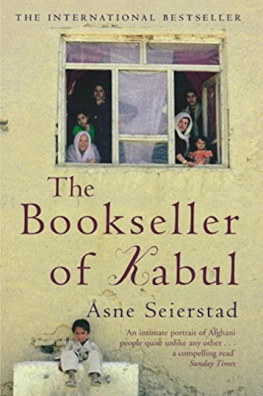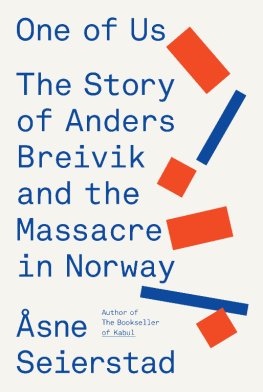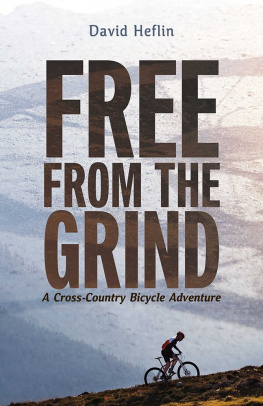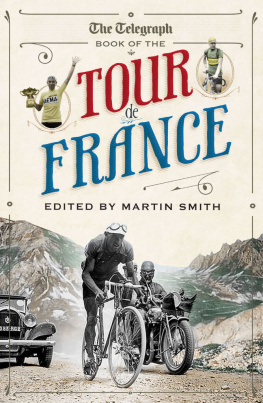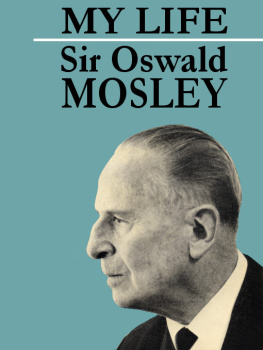
sne Seierstad
The Bookseller of Kabul
Copyright sne Seierstad, 2002
Translation Ingrid Christophersen, 2003
One of the first people I met when I arrived in Kabul in November 2001 was Sultan Khan. I had spent six weeks with the commandos of the Northern Alliance in the desert by the Tajikistani border, in the mountains of the Hindu Kush, in the Panshir Valley, and on the steppes north of Kabul. I had followed their offensive against the Taliban, I had slept on stone floors, in mud huts, and at the front, travelled on the back of lorries, in military vehicles, on horseback and on foot.
When the Taliban fell, I made for Kabul with the Northern Alliance. In a bookshop I happened upon an elegant, grey-haired man. Having spent weeks amongst gunpowder and rubble, where conversations centred on the tactics of war and military advance, it was refreshing to leaf through books and talk about literature and history. Sultan Khans shelves were weighed down by books in many languages; collections of poems, Afghan legends, history books, novels. He was a good salesman; when I left the shop after my first visit I was carrying seven books. I would often pop in when I had some spare time, to look at books and talk to the interesting bookseller, an Afghan patriot who felt let down by his country time and again.
First the Communists burnt my books, then the Mujahedeen looted and pillaged, finally the Taliban burnt them all over again, he told me.
I spent hours listening to the booksellers stories about his battles against the different regimes and their censors, how he launched his personal fight, hiding books from the police, lending them out to others and finally going to prison for it. He was a man who had tried to save the art and literature of his country, while a string of dictators did their best to destroy them. I realized that he was himself a living piece of Afghan cultural history: a history book on two feet.
One day he invited me home for an evening meal. His family one of his wives, his sons, sisters, brother, mother, a few cousins was seated on the floor round a sumptuous feast.
Sultan recounted stories, the sons laughed and joked. The atmosphere was unrestrained, and a huge contrast to the simple meals with the commandos in the mountains. But I soon noticed that the women said little. Sultans beautiful teenage wife sat quietly by the door with the baby in her arms. His first wife was not present that evening. The other women answered questions put to them, accepted praise about the meal, but never initiated any conversation.
When I left I said to myself: This is Afghanistan. How interesting it would be to write a book about this family.
The next day I called on Sultan in his bookshop and told him my idea.
Thank you, was all he said.
But this means that I would have to come and live with you.
You are welcome.
I would have to go around with you, live the way you live. With you, your wives, sisters, sons.
You are welcome, he repeated.
On a foggy day in February I moved in with the family. My only possessions were my computer, some notebooks and pens, a mobile phone and what I was wearing. Everything else had disappeared en route, somewhere in Uzbekistan. I was welcomed with open arms, and gradually felt comfortable in the Afghan clothes I was lent.
I was given a mattress on the floor next to Leila, Sultans youngest sister, who had been assigned the task of looking after my well-being.
You are my little baby, the nineteen-year-old said the first evening. I will look after you, she assured me and jumped to her feet every time I got up.
Sultan had ordered the family to supply me with whatever I wanted. I was later told that whoever did not comply with this demand would be punished.
All day long I was served food and tea. Slowly I was introduced into family life. They told me things when they felt like it, not when I asked. They were not necessarily in the mood to talk when my notebook was at hand, but rather during a trip to the bazaar, on a bus, or late at night on the mattress. Most of the answers came about spontaneously, answers to questions I would not have had the imagination to ask.
I have written this book in literary form, but it is based on real events or what was told me by people who took part in those events. When I describe thoughts and feelings, the point of departure is what people told me they thought or felt in any given situation. Readers have asked me: How do you know what goes on inside the heads of the various family members? I am not, of course, an omniscient author. Internal dialogue and feelings are based entirely on what family members described to me.
I never mastered Dari, the Persian dialect spoken by the Khan family, but several family members spoke English. Unusual? Yes. But then my tale from Kabul is the tale of a most unusual Afghan family. A booksellers family is unusual in a country where three quarters of the population can neither read nor write.
Sultan had picked up a colourful and verbose form of English while teaching a diplomat his own Dari dialect. His young sister Leila spoke excellent English, having attended Pakistani schools when she was a refugee, and evening classes in Afghanistan. Mansur, Sultans oldest son, also spoke fluent English, after several years of schooling in Pakistan. He was able to tell me about his fears, loves, and his discussions with God. He described how he wanted to immerse himself in a religious cleansing process, and he allowed me to accompany him on the pilgrimage to Mazar, as an invisible fourth companion. I was included in the business trip to Peshawar and Lahore, the hunt for al-Qaida, the shopping trips in the bazaar, the hammam, the wedding and wedding preparations, visits to the school, the Ministry of Education, the police station and the prison.
I did not personally take part in Jamilas dramatic fate or Rahimullahs escapades. I heard about Sultans proposal to Sonya from those involved in the story; Sultan, Sonya, his mother, sisters, brother and Sharifa.
Sultan didnt allow anyone else outside the family to live in his house, so he, Mansure and Leila acted as my interpreters. This of course gave them a large influence over their family story, but I double-checked the various versions and asked the same questions of all three interpreters, who between them represented the large contrasts within the family.
The whole family knew that the purpose of my stay was to write a book. If there was something they did not want me to write, they told me. Nevertheless, I have chosen to keep the Khan family and the other people I quote anonymous. No one asked me to, I just felt it was right.
My days were the familys days. I woke at the break of day to howling children and mens commands. I waited my turn for the bathroom, or stole in when everyone had done. On lucky days there was still some warm water left, but I soon learnt that a cup of cold water in the face could also be refreshing. For the remainder of the day I stayed at home with the women, visited relatives and went to the bazaar, or I accompanied Sultan and his sons to the shop, round town or on journeys. In the evenings I shared a meal with the family and drank green tea until bedtime.
I was a guest, but soon felt at home. I was incredibly well treated; the family was generous and open. We shared many good times, but I have rarely been as angry as I was with the Khan family, and I have rarely quarrelled so much as I did there. Nor have I had the urge to hit anyone as much as I did there. The same thing was continually provoking me: the manner in which men treated women. The belief in mans superiority was so ingrained that it was seldom questioned.
Next page


